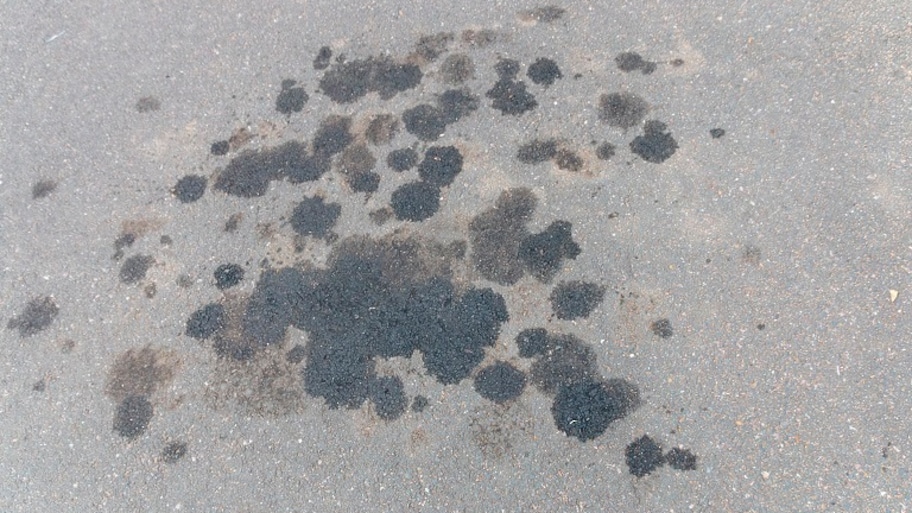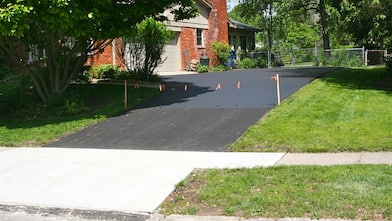Know how to remove stains from your driveway and garage will help you maintain an exterior that is worthy of coming home to
Our driveways take a lot of punishment, no question. From exposure to the elements to the daily grind of handling vehicles large and small, we ask a lot of our concrete and asphalt. But your driveway provides more than just function. Your driveway and garage offer the first welcome to your family after a long day away from home. Other people see these first, too, and that means the conduction of your driveway and garage can make or break your home’s overall curb appeal. Knowing how to remove stains from driveways and garages can mean the difference between a house you can’t wait to come home to and one that makes you want to drive on by.
Removing Stains from Your Driveway and Garage Floors
Keeping your asphalt and concrete stain-free doesn’t require a lot of hard work, but it does take consistency and know-how.
Step 1: Stay Vigilant
In general, you can remove newer stains far more easily than older ones. If you can get to the stains before they’ve had a chance to seep into your pavement, then you can probably prevent staining completely.
If your teenager’s friend drives a clunker that leaves oil, gasoline, or other fluid on your driveway, your best bet is to tackle it before it’s had time to penetrate beyond the surface of the driveway.
First, pour some absorbent material like cat litter or baking soda on the stain and let it sit for a few hours. Then, remove the soiled material with a broom, shovel, or water hose, depending on the amount and consistency of the debris. Finally, wash the remaining stain with bleach or detergent. Laundry detergent or even dish soap can work well for most spills. For more stubborn stains, though, you may need a more potent solution designed specifically for concrete and asphalt driveways and garages.
Step 2: Treat Set-In Stains Correctly
If the stain has already set in (and that’s probably the case, since few of us have time to spend on constant spill patrol), then you’ll need to know what kind of stain you’re dealing with before you try removing it. Using the wrong substance can make the stain harder to treat.
So, the first thing to do is determine whether you’re dealing with oil, antifreeze, rubber marks, or some other kind of stain.
Oil and Antifreeze Stains: Most set-in driveway stains come from oil or antifreeze spills and leaks, and plenty of products can remove these stains. Start by applying a degreaser, such as Zep pressure washer solution or even good old Pine-Sol to the stain. Let the area soak for a few minutes, and then scrub it in with a stiff brush.
After that, clean the area using a pressure washer and a detergent designed for power washers, such as Zep, to target the stain. After that, powerwash the entire driveway or garage. This power-washing double-whammy will help dig out even the most set-in stains. Of course, if you don't have access to a pressure washer, you can always hire a professional cleaning and repair service to do the job safely.
Or, if you prefer to DIY it, you can try various cleaning solutions, like dishwasher detergent, trisodium phosphate, or commercial concrete cleaner. Just wet the area, scrub in the cleaner and rinse it away. Be prepared to invest some time and sweat equity, though, because deep stains may require several attempts to remove them altogether.
Rubber Tire Marks: Hot tires can leave unsightly black marks on sealed concrete driveways. It happens when chemicals that keep the tires soft leach into concrete sealers, leaving black streaks. Cleaning and removing these streaks may just require a little degreaser and some scrubbing, or you may need to use a solvent or chemical stripper to remove the sealer.
Once the stain is gone, you might consider resealing the driveway with a higher-quality sealer to prevent the problem from happening again. After all, concrete driveways cost more than others, and they can add a lot of value to your home, but only if you can keep them looking great!
The I-Have-No-Idea-What-This-Is Stain: Trying to identify the source of some of the stains that can accumulate on your driveway and garage can feel a bit like a task for Forensic Files or NCIS, but don’t despair. True, stains formed by means other than car liquids or tires can sometimes be difficult to remove and clean, as they don't all disintegrate well when exposed to degreasers or solvents.
But you still have options for tackling that disconcertingly mysterious and slightly alien-looking blob on your asphalt. For stains of unknown origins that don't come up with household cleaners, consider hiring a contractor who has access to a high-power washer or power scrubber. A professional will also have a wide array of stain-removing chemicals—and the know-how to use them safely and correctly.
3. Reseal After Stain Removal
Concrete or brick driveways don't need to be sealed as often as asphalt driveways, but there’s no better time to reseal a driveway than right after you’ve given it a good cleaning and sent those unsightly stains packing.
If you decide to reseal the driveway yourself and you have a concrete driveway, let it dry for a few days after cleaning, and make sure that it won't rain for the next few days after that. Then, apply the sealer as if you were painting the driveway, and make sure to let it dry according to the directions before you start using the driveway again.
A Special Note About Asphalt: If you’re removing set-in stains from asphalt, you probably won’t have a choice but to reseal your driveway or garage immediately after. Asphalt driveways require a little more care when you're trying to remove driveway stains because petroleum derivatives will eat into the asphalt and destroy that section of the driveway, so you should avoid any detergents or cleaners that contain solvents when cleaning stains.
Additionally, car fluids and oils that cause the stains in the first place will also damage the driveway. So resealing your asphalt driveway or garage after you clean up the stains will probably save you a lot of headache down the line.




